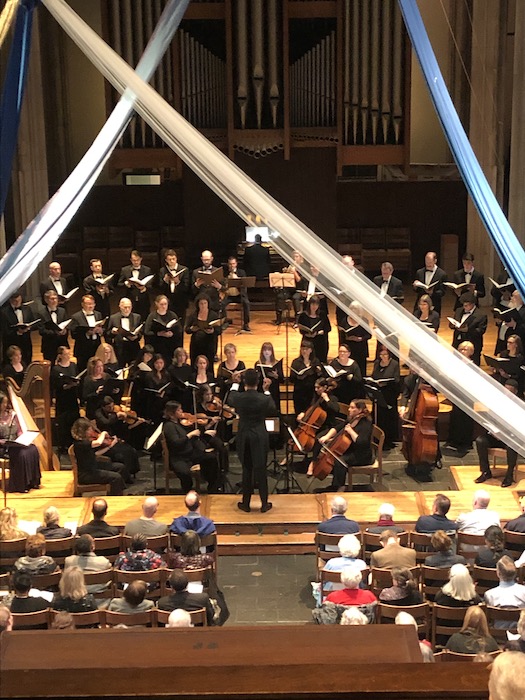Dessoff Choirs delivers a deeply felt performance of Fauré’s “Requiem”

The Dessoff Choirs may be an amateur ensemble, but that distinction has mostly to do with money and not skill. The ensemble has been around since 1924, and their pedigree includes not only the common-practice choral repertoire but premieres of works by George Perle, Eve Beglarian and Matthew Aucoin.
Time is money, and money is practice and rehearsal time: The choir doesn’t have the crispest articulation of non-English languages, but then the members have other pressing obligations in their lives. As heard on Saturday afternoon at Union Theological Seminary, they had a warm, colorful sound, and performed with the welcome feeling that they are personally embracing what they sing.
The featured work would be Fauré’s Requiem, the Choirs augmented with two soloists, soprano Laquita Mitchell and baritone Donovan Singletary. But another powerful draw was, for at least one listener, the promised opener: Prelude for Voices by William Schuman.
The New York City classical concert scene suffers from a dearth of Schuman. On parochial grounds alone, one would expect to hear this former Juilliard president’s music more often. Considering he was also one of the finest symphonic composers of the 20th century, the mind boggles at his repertory absence — even if Prelude for Voices is not the best representation of his work.
With the singers surrounding the audience in James Memorial Chapel, and their skillful director Malcolm J. Merriweather and soloist Mitchell positioned in the center aisle, there was a thrill in hearing Schuman’s stacked triads burst forth into a monumental major key. But overall this musical architecture wasn’t the most fruitful frame for the massed voices.
Mitchell brought gravity to the rather stiff inexpressive solo writing, and the choir was impeccable in their turn. But the music felt awkward and dated. Schuman set passages from Thomas Wolfe’s Look Homeward Angel, which has not aged well — the introspection of the text came off as self-involved and oblivious. The optimism that is one of Schuman’s consistent qualities sounded misplaced in our cynical era.
The rest of the concert was more attractive and pleasurable, and the choir had a better opportunity to show off their musicality in a motet attributed to Bach and in the Kyrie from Louis Verne’s Messe solennelle, Op. 6.
Music scholars have been discussing the provenance of “Ich lasse dich nicht” since its discovery late in the last century; did Bach write it, or was it Johann Cristoph Bach, his father’s cousin? Conductor John Eliot Gardiner has suggested that Johann Sebastian perhaps copied part of it from Johann Cristoph, and the closing chorale, which is indeed by Bach, was added later by a publisher.
The opening verse was gentle and burnished in the choir’s singing, sounding like a simplified version of Bach’s style, and the closing chorale was glowing and fluid. It was a gorgeous performance, equalled by Vierne’s sumptuous Kyrie. The blend and balance between singers and organ, played by Nathaniel Gumbs, was excellent. Though the choirs’ articulation was a touch mushy, their colors were vivid, and the meaning of the music came through strongly. The cliché that music a professional might consider routine matters more to an amateur, and is thus more exciting and more real, proved true.
That was also the strength of the Requiem performance, which was quite fine. One was impressed not only by the supple strength of the singing but also by the internal beauty — the choir felt this inside themselves, and one heard it in their voices. Singletary gave this all a tremendous boost. While Mitchell’s polished, butterscotch tone was eminently refined, the baritone added a sense of expressive urgency to his gorgeous voice, and his phrasing and dynamics were deeply personal. One left this fine performance anticipating his singing as Jake, when Porgy and Bess returns to the Met in January.
The Dessoff Choirs sings Handel’s Messiah, 4 p.m., December 7 dessoff.org


